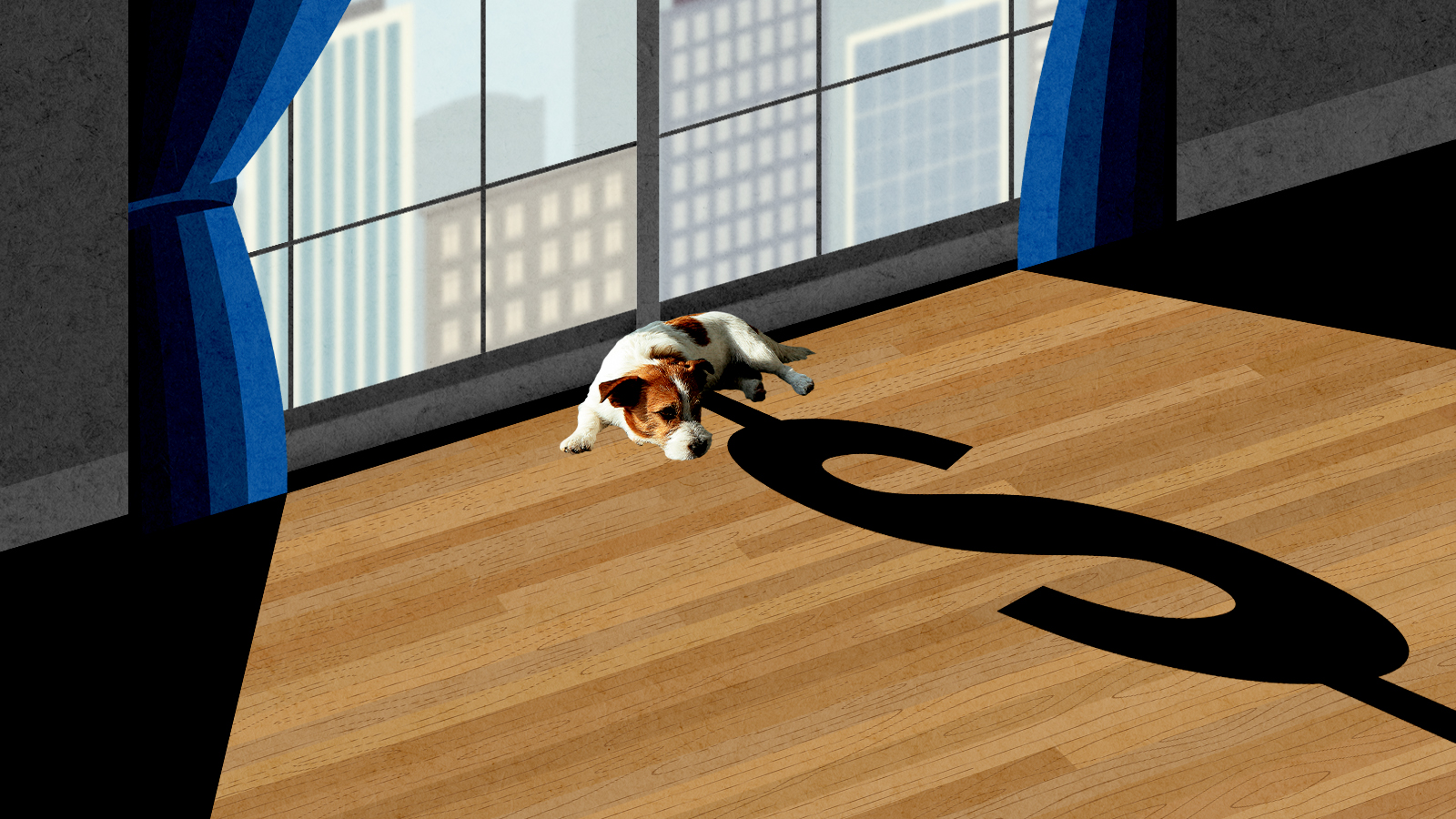Why pet rent is so hotly contested
What is pet rent, and is it even legal?


A free daily email with the biggest news stories of the day – and the best features from TheWeek.com
You are now subscribed
Your newsletter sign-up was successful
Pet owners can often expect to pay a one-time pet security deposit or a non-refundable pet fee when they start a new lease. However, landlords everywhere are tacking on an additional monthly fee for furry roommates, catching some pet owners off guard. Pet rent is slowly becoming the norm, and the extra cost puts some pet owners in an inconvenient position. Can landlords put a price on companionship?
Here's everything you need to know about pet rent:
What is pent rent?
It's not uncommon for pet owners to get hit with extra charges when renting an apartment. Pet-friendly apartments typically charge a one-time pet deposit or fee upfront when you sign the lease. Prices range from $50 to hundreds of dollars and might be non-refundable. Many landlords have added pet rent, a monthly fee ranging from $10 to $50 on top of the regular rent.
The Week
Escape your echo chamber. Get the facts behind the news, plus analysis from multiple perspectives.

Sign up for The Week's Free Newsletters
From our morning news briefing to a weekly Good News Newsletter, get the best of The Week delivered directly to your inbox.
From our morning news briefing to a weekly Good News Newsletter, get the best of The Week delivered directly to your inbox.
Landlords say the fees are meant to offset the cost of any damage the pets might cause to the property. Nicole Ryan, a spokesperson for the National Apartment Association, told MarketWatch that if local laws permit it, landlords could implement the recurring monthly pet rent to cover the costs of "increased wear-and-tear" caused by pets. This would include any cleaning, maintenance, or landscaping costs incurred after renters with pets move out of the property.
Earlier this year, a U.K. survey found that 85 percent of landlords and agents reported damage to their property by pets. However, some studies indicate that some landlords are charging deposits and pet rent that exceed the cost of pet-related damages. The 2021 "Pet Inclusive Housing Initiative Report" from Michelson Found Animals and the Human Animal Bond Research Institute found that tenants pay $864 in deposits and $600 a year in extra rent fees. Yet, "the average dollar amount of extra damages caused by pets is $210 and many residents choose to pay for these damages out of their own pockets."
Is pet rent legal?
Laws and regulations regarding security deposits, rentals, and pets vary, so landlords and tenants must be familiar with local, state, and federal laws. Security deposits are generally legal, but some states limit how much a landlord can collect. For example, states that have rent control laws prohibit landlords from charging higher than a specified amount for a deposit.
As long as the total rent price doesn't exceed the local legal maximum, landlords are allowed to add an additional monthly fee for pets. In a blog for Lawyers.com, attorney Ann Cotton wrote, "Higher rent for pet-owning tenants is legal — rent is rent, no matter how the landlord divvies it up." The only pet owners exempt from any extra fees are those who have trained service or assistance animals, per Dame Magazine. It is illegal everywhere to charge an additional fee for tenants with disabilities that need their service animal. In some cases, emotional support animals qualify for the exemption as well.
A free daily email with the biggest news stories of the day – and the best features from TheWeek.com
Why are pet owners against paying pet rent?
Besides the fact that pets don't work to pay bills? Some pet owners feel that the additional price of pet rent, no matter how small, adds to the financial burden of being a renter, especially amid persistent inflation over the last year. The latest consumer price index report found that while inflation rates decreased over the previous month, rent costs were the most significant contributor to November's inflation. Rent prices increased 0.8 percent over October, a slight increase from the last report.
The price of caring for furry roommates is on the rise as well. A LendingTree survey found that 75 percent of pet owners said inflation caused them to spend more on pet care, and 26 percent said they struggled to keep up with extra costs. Animal shelters reportedly have seen an increase in owners surrendering their pets due to higher housing costs, including pet rent, per MarketWatch. Experts say the rising cost of renting with pets is one of the top reasons pets are turned into shelters.
Strict restrictions about which pets are allowed and the extra financial burden of pet rent can make it difficult for homeless pet owners to find housing. Ruby Aliment, Sara Rankin, and Kaya Lurie of the Homeless Rights Advocacy Project write that the extra costs are one reason "attempts to rehouse pet owners experiencing homelessness are consistently unsuccessful." While some pet owners try to hide their pets to avoid fees, they put themselves at risk of eviction.
The authors of a recent research paper, "Pet Friendly For Whom?" found that tenants in marginalized communities are bearing the brunt of high pet rent fees. They concluded, "Low-income communities and communities of color were more likely than higher income and predominantly white communities to pay disproportionately higher fees to keep pets in their homes." In some cases, landlords might use pets as leverage to retaliate against low-income tenants. Attorney Dianne Prado told Dame Magazine, "A tenant complains about a leak or infestation, and the next thing they know, an animal control officer is knocking at the door. The landlord has called to report them as abusers."
The research paper's authors conclude that "pet fees are yet another discriminatory practice that inevitably leads to poorer housing security and potentially increased evictions among already disadvantaged and marginalized populations."
Theara Coleman has worked as a staff writer at The Week since September 2022. She frequently writes about technology, education, literature and general news. She was previously a contributing writer and assistant editor at Honeysuckle Magazine, where she covered racial politics and cannabis industry news.
-
 How the FCC’s ‘equal time’ rule works
How the FCC’s ‘equal time’ rule worksIn the Spotlight The law is at the heart of the Colbert-CBS conflict
-
 What is the endgame in the DHS shutdown?
What is the endgame in the DHS shutdown?Today’s Big Question Democrats want to rein in ICE’s immigration crackdown
-
 ‘Poor time management isn’t just an inconvenience’
‘Poor time management isn’t just an inconvenience’Instant Opinion Opinion, comment and editorials of the day
-
 The video game franchises with the best lore
The video game franchises with the best loreThe Week Recommends The developers behind these games used their keen attention to detail and expert storytelling abilities to create entire universes
-
 The buzziest movies from the 2023 Venice Film Festival
The buzziest movies from the 2023 Venice Film FestivalSpeed Read Which would-be Oscar contenders got a boost?
-
 America's troubling school bus driver shortage
America's troubling school bus driver shortageSpeed Read Kids are heading back to school, but they might be having trouble getting a ride
-
 5 college admissions trends to watch out for this year
5 college admissions trends to watch out for this yearSpeed Read College advisers and admissions experts say these trends will shape the 2023-2024 admissions cycle
-
 What's going on with Fyre Festival II?
What's going on with Fyre Festival II?Speed Read Convicted felon Billy McFarland claims the music festival will happen, for real this time
-
 The answer to rising home prices: smaller homes
The answer to rising home prices: smaller homesSpeed Read Builders are opting for fewer rooms and more attached styles as frustrated homebuyers look for affordable options
-
 5 illuminating books about the video game industry
5 illuminating books about the video game industrySpeed Read Cozy up with a few reads that dig into some of the most fascinating parts of video game history
-
 Everything we know about the final season of 'Stranger Things'
Everything we know about the final season of 'Stranger Things'Speed Read The Netflix hit will turn things up to eleven in its final bow ... eventually
